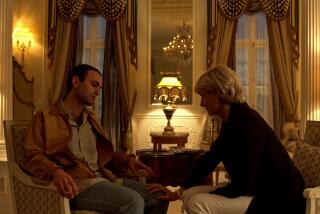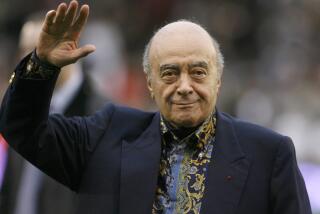Despite Wealth, R-E-S-P-E-C-T Eludes Fayed in British Society
- Share via
LONDON — In his native Egypt, he is lionized for making billions and producing a son whose whirlwind romance with a princess fed dreams of a liaison between British royalty and Arab wealth.
The French government honored him with the Legion of Honor. The Italians gave him the Order of Merit.
In his adopted British homeland, where he has lived for 35 years, he has given generously to charity and spent lavishly on aristocratic trappings--a Scottish castle, a 500-acre country estate and the landmark Harrods department store.
But Britain has never opened its arms to Mohammed Fayed--or “Al Fayed,” as he prefers to be known.
The flamboyant merchant, whose son Dodi died in the car crash that killed Princess Diana a year ago, is shunned by the royal family and much of the “establishment.” The government has accused him of lying. He is regularly vilified in the popular press with such epithets as “morally and personally repugnant” and “ill-mannered self-seeker.”
Still, Fayed remains on a quest for British citizenship, already once denied.
And he is determined to clear his name--to disprove a government report that he misrepresented his origins, wealth and business interests when he purchased a chain of stores that included the crown jewel of Harrods in 1985.
Over the last 15 years, the billionaire and his younger brother, Ali, have been buying British status symbols--Harrods; shirt makers Turnbull & Asser; the 150-year-old humor magazine Punch; the Fulham Football Club, a professional soccer team.
One thing he has not been able to buy is respect.
“Al Fayed is too flamboyant for the English, and he makes them nervous,” says Harold Brooks-Baker, director of Burke’s Peerage, a publishing company that specializes in the aristocracy.
“The English are not snobbish. They will receive anyone in society who acts as they think a human being should act. They don’t care whether they’re Arabs, Romanians, Jews, insurance salesman, grocers or actors. But they have to play by low-key rules that the English devise--and Al Fayed ignores those rules.”
A man of many parts, Fayed is said to be exceedingly charming, devastatingly dismissive and decidedly autocratic.
He instituted a dress code at Harrods--even for customers--which he rigorously enforces during frequent walks around the store.
An overweight American tourist dressed in designer leggings and a long shirt was famously kicked out of Harrods. Another American waiting for his wife to try on an expensive dress says he was hustled behind a large plant by a salesclerk who spotted Fayed heading their way. His crime: He wasn’t wearing acceptable footwear.
Fayed has been accused of electronically eavesdropping on employees, firing minority workers without cause and rifling through the safety-deposit boxes rented to customers in Harrods’ basement.
He is a man with visions--critics would say delusions--of grandeur.
Years ago, in an apparent effort to enhance his family’s standing, he added “Al” to his name, meaning “THE Fayeds.” And in Harrods, this son of the land of pharaohs has created an Egyptian Hall with 12 sphinxes--each bearing his own face and the name “Al Fayed” in hieroglyphics.
His personal luxuries are those of the ultra-rich: homes in France and Switzerland; an apartment in New York; the sumptuous English estate where he lives with his second wife, with whom he has four children; a fleet of helicopters and luxury cars; a yacht in the Mediterranean.
Only last summer, Fayed played host to Diana and her sons on the yacht, a major coup. During that sun-drenched cruise, his eldest son, Dodi, embarked on a highly publicized romance with the princess.
But Fayed’s dreams that they might marry--a triumph over the establishment that had snubbed him--ended when their chauffeur-driven Mercedes crashed in a Paris tunnel last Aug. 31, killing Dodi, Diana and their driver.
Fayed has since aggressively squandered the outpouring of public sympathy over the loss of his son.
Days after the crash, Fayed said he had been told Diana’s dying words--purportedly a message to her family that he then dramatically altered several times.
His insistence that Diana and Dodi were about to announce their engagement--and his “99.9%” conviction, shared by many in the Arab world, that they were victims not of a drunk driver in his employ but of a conspiracy over fears Diana might marry a Muslim--have angered and upset her family and friends, royal circles and legions of ordinary Britons.
After 16 years, Harrods lost its sponsorship of the Royal Windsor Horse Show--one of Queen Elizabeth II’s favorite events--and Fayed was chastised over the use of royal crests on Harrods stationery.
“At every turn, I am beset by petty, spiteful and malicious attempts to put me in my place,” Fayed, who declined to give an interview to the Associated Press, wrote this summer in The Sunday Times of London.
Fayed’s most recent outburst was aimed at Diana’s mother, Frances Shand Kydd.
After she ignored him during an eight-hour hearing in a Paris courtroom in June, he accused her of “acting like the Queen of Sheba,” called her “a bad mother” and said Diana “did not give a damn about her.”
Stung by accusations that he was rude and heartless, Fayed hit back in The Sunday Times, saying he was “proud to be a working-class Egyptian” and entitled to “common respect.”
That spin created a problem: It was completely different from the story he and his financial advisors put out at the height of his epic battle to acquire House of Fraser, the company that owned Harrods.
Much of Fayed’s past remains murky--even his birth date.
A copy of his birth registration--published by his business archrival, the late Roland “Tiny” Rowland--says Mohammed Abdel Moneim Ali Fayed was born Jan. 27, 1929. But Fayed maintains he was born in 1933.
In the family pedigree circulated during the Harrods takeover, the Fayeds were described as a prominent Egyptian family with vast business interests in Europe, the Middle East and the United States.
Grandfather Ali Fayed was said to have founded the family fortune a century ago, growing cotton and exporting it in his own ships to English mills. The family supposedly lived in a mansion in Alexandria, and the children had an English nanny and attended English-style schools.
In an 800-page report, however, Department of Trade and Industry investigators concluded that the Fayeds came from much more modest roots: Their grandfather was not a cotton tycoon. Their father, Aly Aly Fayed, was a teacher. And the family lived in the poor port district of Alexandria.
Fayed was enraged at the report.
After he failed to get Britain’s former Conservative Party government to clear his name, he took his campaign to the European Court of Human Rights. When the court refused to overturn the report in 1994, he took revenge against the Conservatives.
He blew the whistle on two Tory legislators who had accepted brown envelopes stuffed with cash--Fayed’s cash--for asking leading questions at his behest in Parliament during the battle for Harrods. The payments were not illegal, but the “sleaze” scandal that ensued helped defeat the Conservatives last year.
Several months before blowing the whistle, Fayed had applied for British citizenship. Like many foreigners, he has permanent residency. But as an avowed Anglophile and admirer of what he has called Britain’s “great civilized way of life,” he wanted a passport.
No reason was given when Prime Minister John Major’s government turned him down in February 1995--but Conservative anger over the “sleaze” scandal is believed to have been key.
Although Prime Minister Tony Blair’s newly elected Labor Party government announced in December that the citizenship applications from Fayed and his brother would be reviewed, several newspapers reported this summer that the brothers would fail again.
One of those papers, The Sunday Times, in April placed Fayed 11th in its 1998 list of Britain’s wealthiest people--up three places since 1997. But the Times said that his business affairs remained “as shrouded as ever,” and that it was guessing when it put his worth at nearly $2 billion.
Fayed now says that if he had known what Britain had in store for him, he would have put all his wealth into France, where his cash has restored the 100-year-old Ritz Hotel and the former home of the Duke and Duchess of Windsor to their former glory.
There were reports that he planned to give the Windsors’ villa to Diana and Dodi, had they married.
Though his ties to the royals and Diana’s immediate family have dwindled since the crash, one of his staunchest and most vocal allies is Diana’s stepmother, Countess Raine Spencer, who is on the Harrods board.
“What people don’t realize when they attack him so viciously is that Diana liked him so very much herself,” she told The Mirror in July. “She would never have wanted anyone to treat Mohammed the way he has been treated.”
More to Read
Sign up for Essential California
The most important California stories and recommendations in your inbox every morning.
You may occasionally receive promotional content from the Los Angeles Times.













